
Listen to Yourself – What you Should Always/Never Say to Students
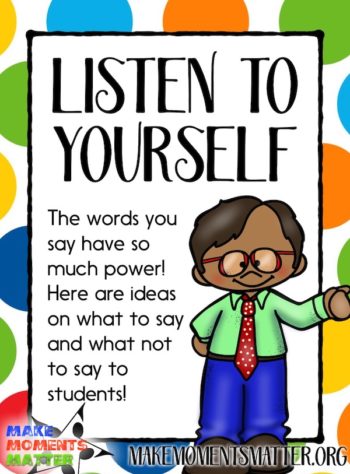 I love reading about teaching practices and ideas and recently I found this great article by BusyTeacher.org about the “5 Things You Should Say to Your Class Every Day.” It got me thinking about what I’m saying to my students, what I’ve had to teach myself NOT to say, and what I’m not saying nearly enough! I was inspired!
I love reading about teaching practices and ideas and recently I found this great article by BusyTeacher.org about the “5 Things You Should Say to Your Class Every Day.” It got me thinking about what I’m saying to my students, what I’ve had to teach myself NOT to say, and what I’m not saying nearly enough! I was inspired!
The words you say have so much power! Kids remember even the littlest things and sometimes it’s the phrases you don’t realize you’re saying that really stick with kids. Even now I can vividly remember my 5th grade teacher and some of the key phrases he would use all the time. “No more Mickey Mousing around!” was a fun phrase from Mr. Rytych that got us all back on track when we were goofing off. I also remember his laugh, his energy, and some of the encourage ways that he would get us to see our own potential.
From now until Christmas Break I’m going to take the “Listen to Myself” challenge. Basically I’m going to be intentional about communicating with students and think about the words/phrases I use and what I can do to make what I’m saying more powerful, effective, and influential. Here are some of the ideas that have already jumped out at me as I begin this process of listening to myself.
#1 – Quit Asking Questions
 Don’t jump on me for this, hear me out! I totally value questions that lead students to good answers and questions that get kids thinking. Teaching critical thinking revolves around asking the right kinds of questions to put learning in the hands of kids. Questions are important.
Don’t jump on me for this, hear me out! I totally value questions that lead students to good answers and questions that get kids thinking. Teaching critical thinking revolves around asking the right kinds of questions to put learning in the hands of kids. Questions are important.
What I hate (and what I’ve found myself doing on such a regular basis) is asking students questions that have only one answer: NO! How many times have you heard or caught yourself saying this, with your angry/disappointed face clearly in place: “Do you think that that’s a good idea?” “Was that a nice thing to say?” “Should you be doing that right now?” Clearly the answer is no. Asking questions that aren’t really questions like this is a crutch and a bad teaching habit. Using questions to modify behavior really doesn’t work and it just frustrates the kids.
Only ask a question if you really want an answer. We try to teach kids to react and give answers when teachers ask questions. You want students to give you answers all the time, so what does it say when you ask students a question that really doesn’t have an answer? If you ask, “Do you think that that’s a good idea?” do you really want an answer? To you, it’s rhetorical. To kids, it’s a question. Questions are supposed to be answered. Don’t ask the question unless you expect an answer other than “no.”
Instead, don’t shy away from giving commands. One of my brilliant methods teachers in college, Dr. Parisi, said “Kids want you to be the authority in the room, so take on that role.” Instead of, “Should you be touching that?” say “Do not touch the instruments when you aren’t supposed to.” Or “Where should you be standing?” say “Everyone needs to be in line with their hands to themselves.” Save the questions for content and not for behavior.
#2 – No More Please and Thank You
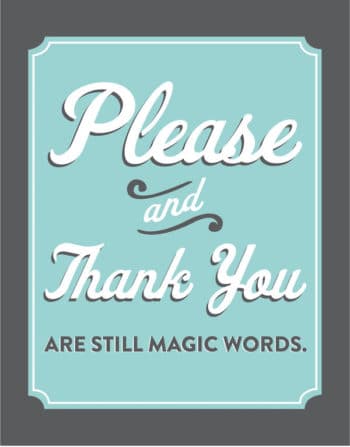 This falls in the same vein as the questions above. If you’re using your angry voice and you’re unhappy with someone, don’t say “Please stop hitting him!!” Or if you spot incorrect behavior, don’t say “Get back to your seat!! (when he does it, you say with your angry eyebrows and stern voice) Thank you!” There are moments for you to use please and thank you with students. Behavior modification is not a moment to use those words in your statements.
This falls in the same vein as the questions above. If you’re using your angry voice and you’re unhappy with someone, don’t say “Please stop hitting him!!” Or if you spot incorrect behavior, don’t say “Get back to your seat!! (when he does it, you say with your angry eyebrows and stern voice) Thank you!” There are moments for you to use please and thank you with students. Behavior modification is not a moment to use those words in your statements.
You’ve been trained all your life to say please and thank you, but it doesn’t apply here. You’re not being nice, you’re being authoritative. Don’t weaken the command by adding a “Please” or “Thank you” that aren’t needed. Saying please is really you asking someone to do something for you. If you asked a fellow teacher “Would you please make me some copies?” they could say no. That’s their option since you’re politely asking. If you say to a student, “Please stop talking while I’m talking!” you’re really not asking them to stop, you’re telling them. It’s not an option for them to NOT stop talking, it’s supposed to be a command.
Kids want clear directions. Adding please and thank you into those statements takes something away from the command. Be clear with what you want: “Don’t touch her any more. Get back to your spot.” They don’t need to be asked nicely, they need to know what you expect. They don’t need to be thanked, they need to follow directions.
#3 – Smart Musicians
 There’s a phenomenal teacher in my district, Jennifer Hall, who uses the phrase “Smart musicians,” all the time. “Smart musicians always check for squeaks when playing the recorder.” “Smart musicians watch the conductor to know when to start and stop.” “Smart musicians always pay attention when the teacher is talking” and so on. “Since we’re smart musicians, we use vocabulary words like piano and forte instead of just saying loud and soft.”
There’s a phenomenal teacher in my district, Jennifer Hall, who uses the phrase “Smart musicians,” all the time. “Smart musicians always check for squeaks when playing the recorder.” “Smart musicians watch the conductor to know when to start and stop.” “Smart musicians always pay attention when the teacher is talking” and so on. “Since we’re smart musicians, we use vocabulary words like piano and forte instead of just saying loud and soft.”
Jennifer is creating a positive culture of success in her classroom. Students believe that they are smart and capable musicians and that they are working to make themselves better. They realize that she’s giving them ways to change what they’re doing but she’s not calling them out or talking about what they’re doing wrong. She’s giving them the chance to work hard and become good at what they’re doing. Jennifer is also building trust and relationships as she says with every breath that she believes in them and wants them to aspire to greatness. How cool is that!
#4 – I love how you sound!
How many adults do you know who say, “Oh! You’re a music teacher! I love music, but I just wish I could sing…” Someone along the line, somewhere told them that they were no good. Maybe someone told them that they couldn’t match pitch or that they didn’t have a good singing voice or that they were too loud. Ugh! I hate that it only takes one negative comment to ruin a person’s idea of self-worth for years to come. How many people do you know who tell you that they’re tone-deaf or that they can’t sing because “Mrs. Johnson in 3rd grade said that I couldn’t.”
I tell my kids that I love how they sound no matter how they really sound. When teaching the arts, you cannot say too often that your students are making good progress and sound amazing. Seriously. We teach a field that relies on students feeling comfortable enough to take chances and try new things. If a student doesn’t feel safe or feels like they might get shot down or mocked, they’re not going to stand up and sing a solo or try and improvise. I see this especially in my English language learner (ELL) students who are so scared just to speak because they’re afraid that they might say something the wrong way with the wrong vowel sound or mess up their word order. Students need to feel secure that they know what they’re doing. They need to know that you’re there to cheer them on and that you want them to try hard because you love how they’re doing. Take every chance you can to tell your students how great they sound and how proud of them you are.
That said, I totally think that you should be giving constructive advice on how a student could sound better. I definitely feel like sometimes I hear myself saying things like this a lot: “Wow! I loved have you did that! Your words were so clear. Now this time, try it with your singing voice instead of your shouting voice.” Personally, I think that that response is preferable to “No! No! Stop that. That’s not your singing voice. Try again and do it the right way this time.” I’m learning that praising growth to any degree is good praise and will benefit me later on. When students feel like you trust them and believe in their ability they will try harder. Praise, praise, praise whenever you can. Modify where you need to, let them try again. Praise, praise, praise again. Repeat!
Okay, all this said, from now until Christmas Break I’m going to take the “listen to myself” challenge and really try to hear what it is that I’m saying to my students AND I challenge YOU to do the same. If you’re a reader, leave me a comment to tell me what it is that you’ve caught yourself saying. I’m likely doing the same… so, we can learn from one another. If you’re a blogger, I encourage you to take the challenge and write about it. Send me a message with a link to your post and I’ll include it below.


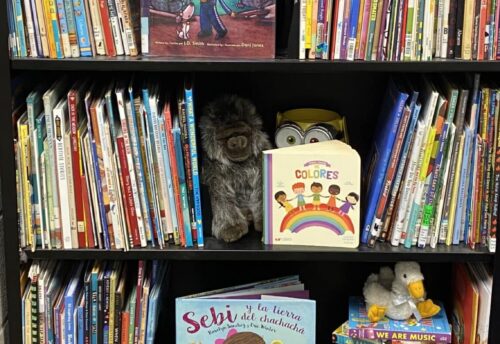
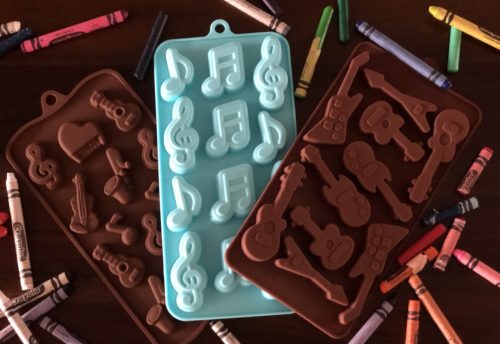
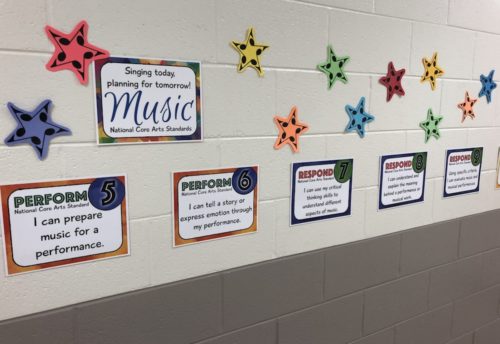
6 Comments